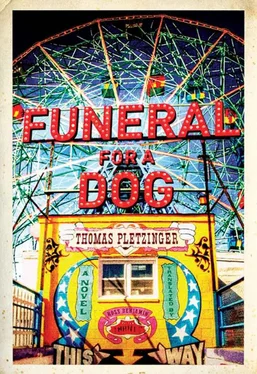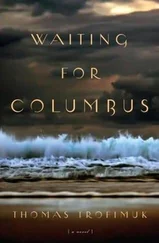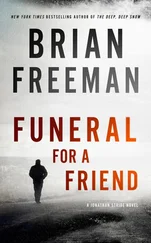Aeroporti Milano Malpensa
With my plastic bag on a bench next to the bus stop (the airport building dull green, fields of light and glass facades). “The best Malpensa-Lugano connection is the Airport Express!” reads the itinerary that Elisabeth’s intern wrote (a greasy person with a telephone voice and an absurd talent for data banks and timetables). Not far away the small woman in the tank top again, now holding the sleepy boy’s hand. She brushes a damp strand of hair from his forehead with her index finger and looks into the emptiness beyond the buses; she is his mother (but above all she has an inscrutable beauty, a slender beauty). Her legs are short, but much too delicate to seem ungraceful. She looks over at me briefly, then she disappears behind a bus (www.airportbus.ch). I could carry her suitcase (I could offer her my life), but she’s apparently traveling without baggage.
Biglietto di andata no 133567
Il biglietto di corsa semplice è valido per il giorno cui è stato rilasciato. La mancata effettuazione del viaggio per causa di forza maggiore o per fatto proprio del passagero non dà diritto ad alcun rimborso, né alla proroga di validità .
Malpensa — Chiasso — Lugano
Sometimes people find themselves on a journey together. To my surprise, the small, pretty woman with the boy gets on the bus to Lugano too, this time she’s sitting a few rows behind me. The bus follows entrance ramps onto the highway, traveling at first over flat land (prefab warehouses, Parmalat and Danone factories, palm trees), at one point through a residential area (the backs of five-story houses, laundry between the windows, lots of pink). I read on in the Svensson file: Dirk Svensson, born in 1973 in the Ruhr area and grew up there, the photo in the publisher’s catalogue shows him smiling in front of a stone house, he’s wearing a shirt with rolled-up sleeves and suit pants. He’s kneeling next to a black dog (you can’t tell if it has only three legs: Svensson is blocking the view). His biography sounds like mine (his shirt rolled up like mine). At Chiasso on the Swiss border, the boy stands on the seat and takes the passports out of his backpack, his mother is asleep now (years ago I learned a smattering of Finnish). I hold up Svensson’s book and wink at him, the boy raises his hand (then the bus station on the mountain over the city, the water is shining in the sun like metal, the boats on it like scratches). When we get off the bus and the boy actually waves good-bye to me, I could go over and speak to the two of them, I could offer the small, pretty mother a cigarette, but she pulls the boy across the plaza toward the city and disappears into a gray concrete entrance (Funicolare, pigeons). I take a taxi to Piazza Manzoni and sit down in a café (three mineral waters, the possibility of another life).
Piazza Manzoni, Lugano, 2:30 PM
I’m waiting for Svensson. I’ll have two hours to ask my questions. Actually, I should skim through the file one more time, but in my fatigue the letters blur (headache). I wait with a view of the fountain. Lugano is a city that is aware of its beauty: through a gap between the houses shimmers the lake, at times a blindingly white sail, chestnuts, ginkgos and palm trees in the early afternoon light. I could get up and leave the folders here, I could wait in the hotel for the return journey (I could refuse). The sun slants steeply on the cobblestones, children and pigeons under the tables, the sparrows on the breadbaskets of the cafés are casually waved away (friendly sparrows are compliments). The light green of the branches hanging toward the water, a boy is feeding swans (8) hamburger buns from a McDonald’s bag, couples have their photos taken in front of the fountain (their faces happy for the duration of the picture). I’m much too early here too. I think of Elisabeth and the numbness that my departure has left behind. Then, despite everything: that I’m not appropriately dressed for an interview (flip-flops and red wine stains). In the Manor department store I buy a clean shirt, I buy another pack of cigarettes (Muratti 2000), I buy postcards (image 1: Monte Brè at Evening , image 2: Vacation in Switzerland , image 3: Ticino Village Scene —all three: Museum of Design, Zurich). I walk along the shore in the direction of the casino, at the Riva Albertolli I sit down on a bench by the water (red; the last surge of pain directly above my nose). The green pedal boats lie waiting in the water, reluctantly I write down
— Who exactly is Dirk Svensson?
— Why should I be the one to ask him this question?
— Where does he live and why there? — How does he live?
— Why a children’s book?
— Is Svensson first and foremost an author or illustrator?
— Can you be two things at the same time?
and suddenly there’s the small, pretty woman with the boy (ice cream on his T-shirt) sitting two benches down. She wipes his mouth clean and then licks his ice cream off her finger, she takes a cigarette out of his backpack. She looks over at me, and this time she laughs. In front of her stands a small suitcase. Up to this point we’ve taken the same path, but soon I’ll meet Svensson. We’ll go our separate ways, we’ll have to part. I concentrate and write
— Can you want two things at the same time?
— Does the black dog really exist? And if so:
— Where is its fourth leg?
— Who exactly is Daniel Mandelkern?
Lua
I’m early, Svensson is early. There really is a black dog with three legs standing on the deck and coughing as the boat docks ( Macumba in blue writing on the pale wood). Dirk Svensson pushes the gearshift into neutral with the ball of his thumb and throws the line to me (the children’s book author in a purple T-shirt and taller and heavier than in the pictures). Hello, I say, it’s very nice to meet you. Svensson shuts off the outboard and doesn’t reply, he’s wearing a cap (Los Angeles Lakers, the purple faded, but not the gold). Daniel Mandelkern, I say, but Svensson is looking past me. Macumba scrapes along the green pedal boats. Svensson suddenly ignores his boat, he gives me a nod, me and my tugging at the rope, he climbs across a few pedal boats to the shore. The small, pretty woman with the boy is still sitting two benches down, she’s sitting there in her green, in her beauty, and waiting with the boy in the shade of a linden tree. Svensson leaves me standing there and goes to her (remain polite and get all this over with). Tuuli, he says, and reaches for her wrist and the nape of her neck. The woman gets up, Svensson pulls her up, her back bolt upright, the dog coughs, the dirty swans of Lugano hiss, yellowed as if from cigarettes, the dog barks. Quiet, Lua, says Svensson, quiet.
THE CITY IS FUNCTIONING AGAIN, THE GARBAGE IS GETTING collected, the Brooklyn-Queens Expressway is drivable again, and there are cars on it. The wreckage is being removed, they’ve stopped searching for survivors. My goal tonight is to remove the last splinters of the past few weeks, so I close the door from outside and buy another beer at Giacomo’s. Eventually I’ve had as much as I can take, so I hail a taxi at the entrance ramp and say, Enid’s, at which point the driver turns around and asks why I want to visit his mother, and when I look at him blankly, he says it was only a joke. Great joke, taxi driver with cowboy hat, I think, today I’m in no mood for jokes, today I’m in the mood for a tabula rasa. Lua is black, at night he can hide unnoticed in the taxi’s footwell despite his size, he waits on the roadside and jumps into the car when I open the door. I say, Enid’s, the bar, please, Manhattan Avenue, next exit, and so that he doesn’t ask any more questions but instead keeps listening to country as if I weren’t there at all, I say that I stepped on a nail, inflamed wound, that makes even the shortest distance too far. I understand, says the taxi driver, my mother, God bless her, was named Enid, that’s why. Seventeen years ago she was run over with seven shopping bags in her arms in front of Zabar’s on the Upper West Side, on my birthday. By a Pakistani taxi driver. The shopping bags were for my birthday party. Really? I ask. Really, he says, that’s why I became a taxi driver, the Pakistanis and Indians and blacks drive like Italians. I’m out here to keep the streets clean. Really? I ask. Really, he says, and after his mother’s death he just stopped going to school, good Lord, maybe it’s a coincidence, on his birthday and the anniversary of his mother’s death someone wants a ride to a bar named Enid’s. Would he mind not talking so much, I ask, I have my own problems. The taxi driver takes off his cowboy hat and looks in the rearview mirror, he’s not much older than I, in New York there’s usually a language barrier between driver and passenger, for the safety of both. But today the taxi driver, according to his ID card, is one Jack Vonderlippe, stuck to his Plexiglas window are stars and stripes and pictures of the New York fire department and police, New York’s Finest. A New York taxi driver named Vonderlippe, and there’s even a little flag dangling from the mirror with the inscription “Don’t mess with Texas — not even in NYC!”
Читать дальше












